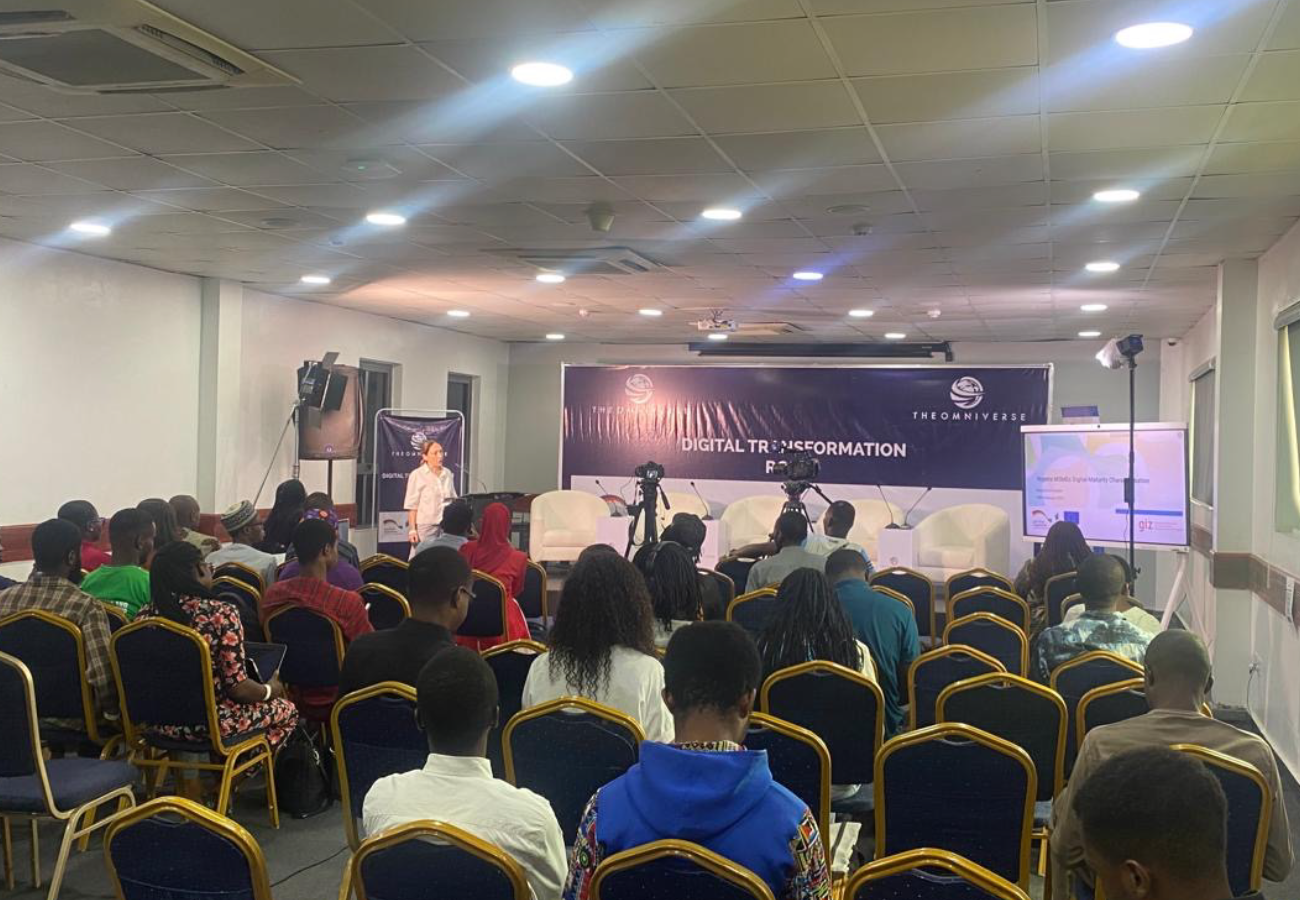On February 28th, 2024, the MSMEs Digital Maturity preliminary Research findings were presented at the GIZ Digital Transformation Room during the Omniverse Summit.
Gbeke Oshinowo, Technical Advisor at GIZ DTC, initiated the engagement session at the Digital Transformation Room. The initial program has seven sessions, centered on the Digital Transformation of MSMEs in Nigeria, followed by the Digitalisation of small businesses, down to the last session on Nigerian Logistics ecosystem.
Gbeke Oshinowo highlighted GIZ DTC’s commitment to empowering SMEs for digital transformation. The panel session, depicted as a pie chart, aimed to facilitate discussions on shaping the future of Nigerian MSMEs, seeking answers, and providing a platform for entrepreneurs to voice their concerns, gain insights from experts, connect with industry professionals, discuss their challenges, roadblocks, and aspirations for digital transformation. Feedback collected during the event will be analysed by the GIZ DTC for future support of Nigerian SMEs.
Dr. Odiong Akpa moderated the first session, titled “Digital Transformation of MSMEs in Nigeria,” which included three panelists:
- Dr. Odiong Akpa, Managing partner, Ubulu Africa
- Dr. Helen Emore, Managing Director, Scientia Innovation Hub
- Oluwaseyi Ogidiolu, Technical Advisor GIZ
Oluwasheyi Ogidiolu, “emphasised the DTC center’s primary focus on supporting the digitalisation of Nigerian MSMEs to bolster the economy’s capacity and promote digital innovation”. Dr. Helen Emore shared that “John Momoh, the founder of Channels Television, served as her inspiration to embark on her entrepreneurial journey”. Reflecting on their shared history within the same organisation, she recalled Momoh’s aspiration to establish the CNN of Africa, a dream he has since realised through his unwavering dedication, resilience, and adept utilisation of knowledge and technology.
When queried about the principal challenges hindering the digitalisation of Nigerian MSMEs, Dr. Helen Emore “identified a lack of knowledge, direction, and focus as prominent hurdles”. With Nigeria boasting 37 million internet users and a robust market presence, she underscored the abundant opportunities awaiting entrepreneurs who proactively seek them out. Addressing a question regarding business perplexities raised by Paul, an entrepreneur in the audience, Oluwasheyi Ogidiolu “stressed the importance of maintaining focus and adopting transformative thinking to overcome such challenges”.
Furthermore, four panelists were invited to the second session entitled “Innovation for Small Businesses Digitalisation.” They were;
- Emmanuel Oladele, GIZ Technical Advisor, Digital Ecosystem
- Dr. Chukwuemeka Azinge, Department of Strategy, Lagos Business School
- Amanda Etuk, Co-founder of Messenger
- Kelvin Ume Chukwu founder of BUMPA
The discussion delves into the perspectives of stakeholders within the ecosystem who are consistently and actively examining the challenges encountered by Nigerian SMEs and exploring ways to provide support. Umechukwu Kelvin elucidates how he has contributed to the transformation of SMEs in Nigeria through BUMPA. “He observed that Nigerian businesses primarily operate to endure”. The BUMPA app facilitates businesses’ transition to the online sphere by offering services such as website creation, inventory management, and sales record keeping, among others.
Dr. Chukwuemeka Azinge “highlighted key challenges in innovation, including the data-centric nature of businesses, lack of digital awareness, and understanding”. Amanda Etuk “emphasized that innovation should revolve around customer preferences, advocating for a digital innovation hub”. While Emmanuel “elaborates on the concept of digital innovation hubs”.
Accordingly, the third session was moderated by Margherita Trestini, General Manager of Apodissi. She introduced the MSMEs Digital Maturity research as a project aimed at understanding the digital awareness and maturity of Nigerian MSMEs in the manufacturing, agricultural and trading sectors. The research objectives are to identify the digital maturity of MSMEs in Nigeria along with their main barriers to digital adoption. The data will be used to delineate SMEs personas.
Although data validation is ongoing, “preliminary outcomes indicate a higher proportion of women in entrepreneurship in Nigeria compared to any European country” says Margherita Trestini. Urban areas showed a high density of businesses aware of technology. Most Nigerian businesses are aware of all technologies and innovations within mobile devices, but they are less familiar with gadgets such as laptops, tablets, and desktops. According to the research findings, the primary barrier to adopting technology for businesses is device affordability and trust.
28th February was the second day of the omniverse summit and was titled ‘Innovation Day’, it’s aim was to help participants understand the strategies for nurturing and inspiring innovation at all levels despite the challenges.


